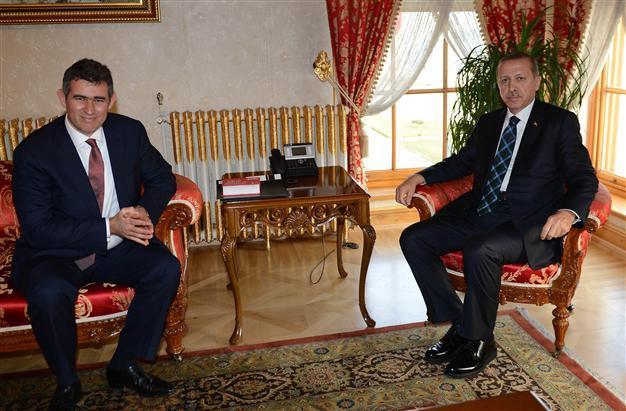PM Erdoğan warm on retrials in coup cases, says head of bars union
ANKARA

Union of Turkish Bar Associations (TBB), Metin Feyzioğlu met with Prime Minister Recep Tayyip Erdoğan on Jan. 5, a day after holding talks with President Abdullah Gül. He will now meet Justice Minister Bekir Bozdağ on Jan. 6. AA photo
Suspects convicted in coup-plot cases over the past year could soon be retried after the head of the Union of Turkish Bar Associations (TBB), Metin Feyzioğlu, said Prime Minister Recep Tayyip Erdoğan viewed proposals for retrials with favor.
“I believe that Mr. Prime Minister is willing to make a move for the retrial [of the coup cases] and the overturning of those sentences that were handed out by those courts and are [being reviewed] at the Supreme Court of Appeals. This is what we talked about for 1.5 hours and what are we working on,” he said.
After meeting with President Abdullah Gül on Jan. 3, Feyzioğlu submitted a seven-point proposal to Prime Minister Recep Tayyip Erdoğan yesterday; he is now set to meet Justice Minister Bekir Bozdağ Jan. 6.
Feyzioğlu announced that the Bar Associations would start working in cooperation with the Justice Ministry to prepare a concrete proposal, expressing hope that this would be ready after Erdoğan returns from a week-long visit to the Far East.
The Bar Associations’ initial proposal includes sending cases to general authorized courts underlining that the special courts which reviewed the Ergenekon and “Balyoz” (Sledgehammer) cases had been abolished by the Parliament last year; overturning the rulings of special courts with legislation that will encompass non-finalized rulings and abolish “catalogue crimes,” in which a variety of crimes are brought together under a single bundle.
“Parliament abolished the special courts on July 5, 2012, saying those had no place in democracies and were contrary to the right of self-trial and universal standards. However, it adopted at the same time a provisionary second article that allowed the finalization of those [cases] that were pending,” Feyzioğlu said during a statement to the press following his meeting with Erdoğan.
“Therefore, our proposal is to remove this second article. I had the impression the Mr. prime minister’s approach was extremely favorable on this point,” he added.
Erdoğan might make a move for retrialFeyzioğlu also said their proposal included the abolition of anti-terror courts along with special courts in order to prevent a “janus-headed” justice system.
Feyzioğlu said they insisted on a legal reform that would “clear the way” for an internal restructuration of the judiciary. “In other words, the legislative power will clear the judiciary’s way and the judiciary will rearrange the lack of confidence in general courts. Again, our impression is that Mr. Prime Minister’s approach on this issue was also very favorable,” Feyzioğlu said.
He added that they were against an amnesty in order not to “humiliate” those convicts who claim their innocence.
Also on Jan. 6, a parliamentary commission established by the government in order to release jailed deputies will gather in Ankara.
The ruling Justice and Development Party (AKP), the Republican Peoples’ Party (CHP) and the Peace and Democracy (BDP) have announced that they will participate to the meeting during which the group deputy chairs will discuss a possible amendment to Article 83 of the Constitution, which regulates immunity, or an amendment to the Code of Criminal Procedure.
Nationalist Movement Party (MHP) who has one deputy currently in jail, Engin Alan, will not take part in the meeting.
Although the MHP will not participate in the gathering, the parties will seek to secure the release of Alan, as well as Sebahat Tuncel from the BDP’s sister party, the Peoples’ Democratic Party (HDP), after both deputies’ convictions were confirmed by a higher court.
HDP co-chair Tuncel may lose her parliamentary seat after the Supreme Court of Appeals approved an eight-year sentence against her on charges of membership in the Kurdistan Workers’ Party (PKK) on Dec. 28, 2013.
